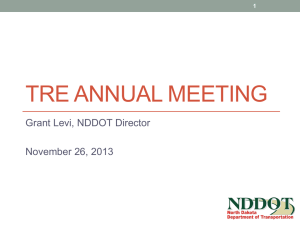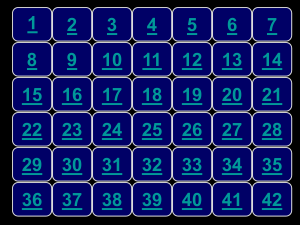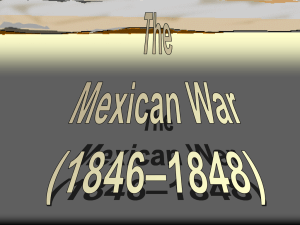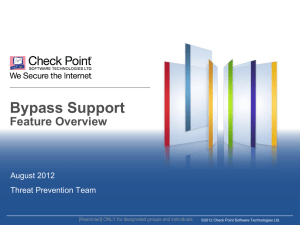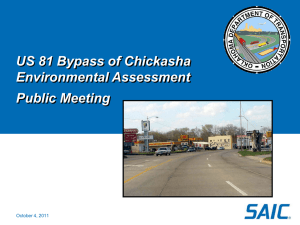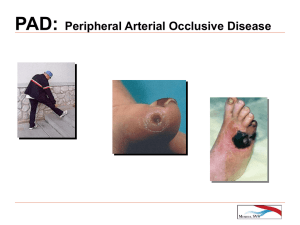road projects
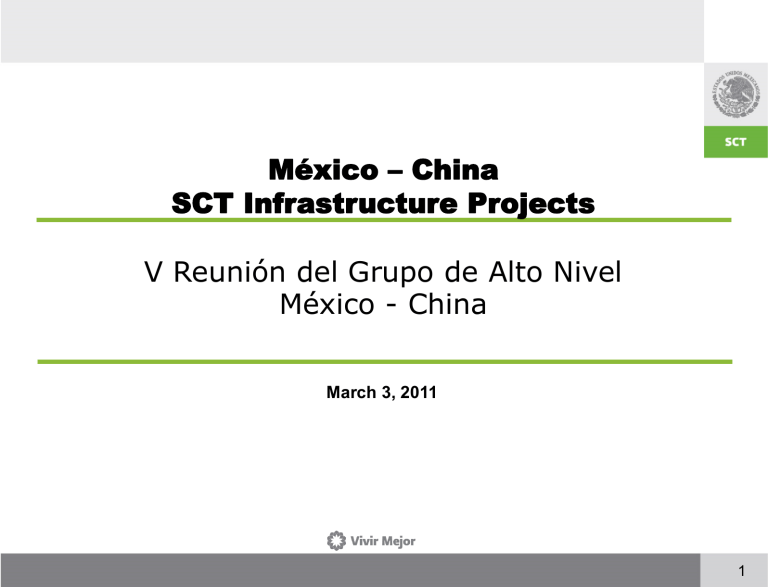
México – China
SCT Infrastructure Projects
V Reunión del Grupo de Alto Nivel
México - China
March 3, 2011
1
Infrastructure needs
Mexico’s trade with the US and Canada has increased over 400% in the last 15 years, while infrastructure investment has only grown less than 50%.
Therefore, greater efforts are required to improve the quality and quantity of infrastructure in order to enhance trade capacity.
Trade between Mexico, the
US and Canada (Billion USD)
Exports vs GDP
(Growth Rate)
GDP Exports
35,5
14,1
4,0
3,2
14,0
4,9
16,7
3,3
8,8
1,5
7,2 4,2
-6,5
-21,2
2004 2005 2006 2007 2008 2009 2010 e e / Estimated
Source: National Institute of Statistics and Geography
2
ROAD PROJECTS (IN PROCESS)
Conclusion of 3 bids in process (365.2 km, total investment of 1.3 billion dollars)
PACÍFICO SUR
(Asset utilization)
SALAMANCALEÓN
(CONCESSION)
MICHOACÁN
(Asset utilization)
3
ROAD PROJECTS
MICHOACÁN PACKAGE (Asset utilizaton BID IN PROCESS)
Package
Michoacán
Existing Highways
Pátzcuaro-Lázaro Cárdenas
(273.2 km)
New Highways
Morelia western bypass (58 km)
Uruapan bypass (24.0 km)
Pátzcuaro-Uruapan (56 km)
Uruapan bypass
Lenght: 24.0 km
Investment: 62.7 mdd
Pátzcuaro – Uruapan
Lenght: 56.0 km
Investment: 94.1 mdd
Western Morelia bypass
Lenght: 58.0 km
Investment: 141.2 mdd
4
ROAD PROJECTS
PACÍFICO SUR PACKAGE (Asset utilizaton BID IN PROCESS)
Package Existing Highways New Highways
Pacífico Sur Guadalajara-Tepic (168.6 km) Guadalajara South bypass (111 km)
Tepic bypass (33.5)
Tepic bypass
Lenght: 33.5 km
Investment: 115 mdd Guadalajara South bypass
Lenght: 111 km
Investment: 414.3 mdd
5
ROAD PROJECTS
SALAMANCA-LEÓN HIGHWAY (Concession bid in process)
SALAMANCA – LEÓN
Lenght 85.0 km
Description: To build a four
highway, alternative to the road
today comunicates Salamanca,
Silao y León.
Monto de Inversión: 230 million dollars.
6
ROAD PROJECTS
To be launched in 2011
Some of the projects under preparation that will start their bidding processes during
2011 are the following:
Project
Length
(km)
Investment
(Million USD)
Cuernavaca Bypass-Concession
Building a four lane bypass at the northeast of the city of
Cuernavaca to give continuity to the traffic towards destinations located at the south of the city.
Guanajuato-San Miguel de Allende Highway- Concession
Construction of a two-lane highway, with five intersections and two toll plazas, that initiates at Aldea Silao interchange, between the Salamanca-Leon (to be constructed) and the
Aldea bypass and finishes at the intersection with the 57 federal road.
Atizapán-Atlacomulco Highway-Concession
Six and four lane highway in isolated stretches to give a new exit towards the west for the traffic of the Mexico City
Metropolitan Area.
Cuapiaxtla – Cuacnopalan Highway-Concession
Construction of a two lane highway between Cuapiaxtla and
Cuacnopalan, to connect the corridor of the High Plateau with the Puebla-Cordoba and Cuacnopalan-Oaxaca highways.
Hermosillo bypass – Concession
Construction of a two lane highway to avoid the long-range traffic through Hermosillo, Sonora
51.9
70
80
62
37
305
195.6
297.4
156.2
93.9
7
ROAD PROJECTS
To be launched in 2011
Project
Length
(km)
Investment
(Million USD)
Ciudad Juárez Bypass and International Crossing
“Guadalupe Tornillo”-Concession
Construction of two lane access between the highways
Chihuahua-Ciudad Juarez and Ciudad Juarez-El Porvenir, in order to improve the long range access to the Mexico–U.S.A border. The project includes the construction of an access to the border port and the Mexican part of the Guadalupe-
Tornillo bridge.
Apaseo-Palmillas-Concession with Assets
Building a four lane highway for long journeys towards the west of the country. This new road would function as an alternate route to the Mexico-Queretaro highway in its
Palmillas-Queretaro stretch.
Campeche Package – Asset utilization
Widening of the of the existing four-lane highway in the 18 km
Champoton-Villa Madero section and building the Champoton bypass, with a total length of 17 km, in the Campeche-Ciudad del Carmen corridor, to foster touristic development in Playa
Esmeralda.
32
80
93.9
250.4
17.0 km.
Bypass
18.0 km. 65.2
Champotón -
Campeche
8
RAILWAY PROJECTS
System 3 of the Mexico City Metropolitan Area Suburban Railway
(Chalco - La Paz – Santa Martha/Constitución de 1917)
Context
Location: Metropolitan Zone of the Valley of
Mexico (State of Mexico)
Description: Massive railroad passenger transportation system, electrified and confined
(using existing railway infrastructure).
It includes the construction of stations, transfer centers, vehicular, pedestrian and railroad bridges, and complementary works.
Length: 73 km.
Bidding process: late 2011.
Benefits
•
•
•
It will reduce:
Journey time(1 hr 20 min)
Road congestion in the Mexico-Puebla highway and federal road (between La Paz
Subway station and the Valley of Chalco)
Air pollution and fuel consumption.
Requirements
Expected traffic: 110 million passengers per year.
Financed with PPP model, concession: public
(Federal and State of Mexico) and private investment.
Estimated Cost : 1,305 million USD.
Construction duration: 24 months.
9
RAILWAY PROJECTS
Celaya Railway Bypass
Context
Location: State of Guanajuato.
Description: Design and construction of a railroad bypass system around the urban area of
Celaya; a new exchange yard, a park for automobile industry suppliers and an intermodal terminal for the handling of fiscal cargo and domestic traffic.
Length: 23.4 km for Line “A” , 27.7 km for Line
“NB”, Total: 51 km.
Bidding process: 2 nd half 2011.
Carretera 45
Línea A
CELAYA
A Nuevo Ladero
PATIO DE
INTERCAMBIO
MENDOZA
Línea B
Empalme
Escobedo
B-315
NB-85
Línea B
NB-77
Patio de Carga
Celaya
A-291 NB-68
Libramiento FERROMEX
SIMBOLOGIA
LINEA “A” FERROMEX
LINEA “NB” KCSM
LIBRAMIENTO FERROMEX
LIBRAMIENTO KCSM
Nuevo Patio de Celaya
Patio de Intercambio
A Lázaro Cárdenas
Línea
“A”
Croquis de
Interconexión Línea
“A” con “NB”
Benefits
Decrease time lost due to the traffic congestion and exchange of trains.
Reduce the number of accidents (avoid more than 18 dangerous rail crossings)
Improve efficiency and competitiveness in the transportation of goods.
Requirements
Financed with PPP model, Public investment:
Federal and local government, and private.
Estimated Cost : 190 million USD.
Construction duration: 2011-2013.
10
AIRPORT PROJECTS
Riviera Maya airport
Context
The Isla Mujeres-Cancun-Cozumel-Tulum corridor is the most important tourist destination in Mexico. It is visited by 9 million
tourists a year and it is forecasted that 17.9
million visitors will visit the area by 2025.
The bidding process for the Riviera Maya airport started in May 2010.
Result of the bid: April 2011
Aeropuerto
Riviera
Maya
The Riviera
Maya airport will be 102 km away from
Cancun airport and linked by a
120 km road.
Benefits
The new airport will foster tourism, economic growth and will create thousand of new jobs in the region.
Requirements
Capacity for 3 million passengers a year.
Financed with private investment.
Estimated Cost : 280 million USD plus a 0.6 million USD road access.
11
PORT PROJECTS
Specialized container terminal II at Lázaro Cárdenas
Context
Construction, operation and exploitation of a Specialized Container. It will increase installed capacity from 2 to 4 million TEUs per year. The port has a strategic railroad connection for the intermodal links to North
America.
Benefits
This infrastructure will meet national and international demand for container activity.
It will offer an operation with international standards and increase the operation of the logistic Asia-Pacific/North America corridor, transforming Mexico into a transcontinental logistics platform.
Requirements
Capacity for 2 million TEUs per year.
Private investment, a partial right and obligation cession contract
Estimated Cost: 440 million USD.
The Container terminal II at Lázaro Cárdenas will have 102 hectares and 1,485 meters for docking.
Monterrey
Nuevo
Laredo
Lázaro Cárdenas
12
PORT PROJECTS
Veracruz Port Expansion in the North Zone
North Zone Project
Total # of docks
(it includes container terminals):
Total area (Ha):
Capacity: Total project
(Million tons)
37
532
124
2 Container Terminals
Total # of docks:
Waterfront (m):
Total area (Ha):
Capacity (million
TEUs)
8
2,880
250
4.1
• Private financing, with estimated investment of 4,100 million dollars.
•1,410 in public investment
•2,690 in private investment
• Estimated job creation: 18,000 jobs.
• Goals: Meet demand for maritime transportation in the
Gulf of Mexico / Atlantic Ocean shore, for international trade in Central Mexico.
• Develop Logistics Activities Zones.
13
PORT PROJECTS
Mazatlán: Multipurpose Terminal
Context
Location: State of Sinaloa.
To operate and modernize the current multipurpose terminal, in an area of 15.2 ha, with 300m quay. Additional 1000m of public quays may also be used.
Mazatlán-Durango highway will be the only direct connection between the north western and north eastern states of Mexico, an opportunity to get additional cargo (fully operational in 2012).
It will handle containers, vehicles and general cargo.
Mazatlán Multipurpose Terminal with equipment available for immediate operations
Benefits
The terminal will help Mazatlán increase its hinterland to the northeast part of Mexico.
Competitive advantage based on smaller transit times, due to conclusion of Durango-Mazatlán highway.
Requirements
Financed with private investment.
Estimated Cost: 40 million USD in port equipment (cranes, reach stackers, fork lifters) and 180 refurbishment of quay 1.
Estimated date for bidding: February 2011.
Expected capacity: 60 thousand TEUs per year
14
THANK YOU
15



